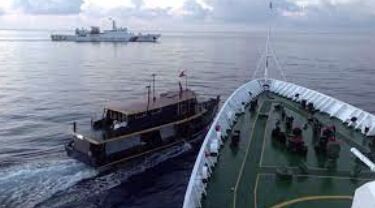Philippines Accuses China of Illegal Actions and Dangerous Collisions in South China Sea, Prompting International Condemnation
Tensions rise as the Philippines accuses China of illegal and dangerous behavior following two collisions in the highly disputed South China Sea, prompting condemnation from the US and other countries.
In the latest escalation of tensions in the highly disputed South China Sea, the Philippines has summoned Beijing's ambassador after accusing China of "illegal and dangerous behavior" that resulted in two collisions. On Sunday, Chinese coast guard vessels blocked and collided with two Filipino vessels near the contested Second Thomas Shoal. The collisions are the latest in a series of maritime confrontations between the two countries in the South China Sea, prompting condemnation from the US and other western countries. The Philippines accused China's coast guard of "dangerous blocking maneuvers" that caused the collisions and imperiled the safety of the Filipino crew.
China, however, defended its actions and accused the Philippines of intruding into Chinese territory. The South China Sea is a highly contested region, with China claiming almost the entire sea, including territory claimed by the Philippines and other neighboring countries. These recent incidents have raised concerns about regional stability and adherence to international law. The US has reiterated its commitment to defend the Philippines under a 1951 Mutual Defense Treaty, citing its responsibility to protect the Philippines in case of an armed attack.
The EU, Canada, and Japan have also expressed support for the Philippines and raised concerns about China's actions. The territorial disputes in the South China Sea have long been a point of contention, and there is a fear that further escalation could bring the US into confrontation with China. The South China Sea is a vital waterway for trade, and any disruption could have significant economic implications. The Philippines plans to raise its concerns over China's dangerous maneuvers in talks between China and the Association of Southeast Asian Nations (ASEAN) on a proposed nonaggression pact.
Meanwhile, China maintains that its actions are justified and that it will continue to safeguard its territorial sovereignty. The situation in the South China Sea remains complex and sensitive, highlighting the ongoing challenge of maintaining peace and stability in the region. Without proper resolution, these maritime confrontations could further escalate tensions and undermine safety, stability, and security in the region.




